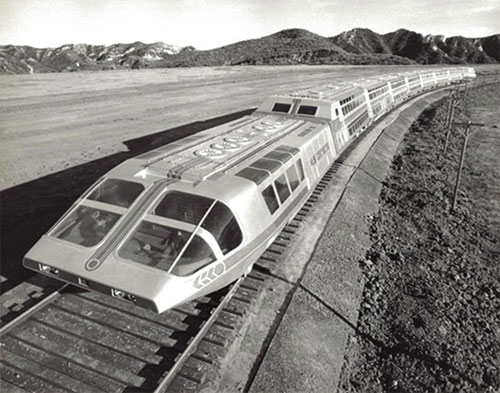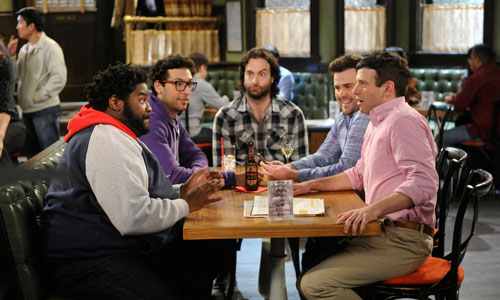What's Your Gimmick?
The numerous ways, throughout television history, that networks have tried to convince us to keep watching. Often, they're big failures.
69

This Train Don't Stop Here Anymore
In 1979, NBC saw how successfulThe Love Boat was for ABC, and decided to take that same concept and put it aboard a super-fancy train. Fancy luxury vehicle? Check. Rotating cast of celebrity characters? Check. Terrible storylines? Double-check.
As you can imagine, this train of thought led directly to a derailment—both in the ratings and of the incredibly expensive model trains the network used.
The resulting series, Supertrain, became one of the most expensive TV series of all time, and was such a massive flop that it nearly bankrupted the network. Despite the massive amount of money spent on the show, nobody seemed excited about it.
"Usually when we do a piece about a new television program going on the air, we come an interview the star of it," NBC News reporter Jack Perkins gritted on a 1979 episode of The Today Show. "Well, we can't do that in this case, because, as many critics have said, the star of this new show is … a trainnnn."
Before Perkins' quip, Tom Brokaw noted that NBC basically needed the show to be a hit. After Gene Shalit noted that the train set itself cost $6 million to build, Brokaw got in a dig: "… and NBC hopes it stays on the tracks. There's a lot of money invested in that one. $6 million may be the low side of the budget."
Those words proved fateful for the network—because it didn't stay on the tracks. The blame went all over the place. Some blamed Dan Curtis, the Dark Shadows creator who executive-produced the series' first five episodes, for having an approach that attempted to throw money at the problem.
Curtis, on the other hand, blamed the idea itself, as well as his lack of time to build something that had a chance of working.
"Frankly, I thought Supertrain was the worst idea I'd ever heard," Curtis recalled in his biography, The Television Horrors of Dan Curtis. "I thought they were out of their minds. But a good friend at NBC said, 'Everybody wants you to do this thing called Supertrain.' And they convinced me to do it—against my better judgment."
Others blamed the focus on the visuals over plots—very costly visuals that NBC paid dearly for when the model train was destroyed in a train derailment. At $250,000, it probably was the most expensive model train accident in history. That was the take of Fred Silverman, the head of NBC at the peak of the fiasco.
"I still think it was a terrific idea. But they were more concerned with carpeting the train than with good scripts," Silverman said in a 1982 interview. (Back in September, he said exactly the same thing: "Till my dying day I'll say it was a great idea. It was just totally (screwed) up in the execution," he told the Associated Press in a career-spanning interview. "Viewers came to the show, looked at it and said, 'Oy!'")
Perhaps the real issue with Supertrain was the environment from which it was built. Silverman had been hired by NBC from ABC, with the goal of bringing the network back to life after years of sagging ratings. Problem is, Silverman built many of the hits that NBC was competing against—including The Love Boat. In essence, Silverman was competing with himself.
In the end, Supertrain's failure is somewhat like the failure of Amtrak to make a profit—it was a costly symptom of a disease called disorganization. But man, is it fun to analyze the wreckage.
"These songs will knock your socks off. They run a gamut from balls-out rock & roll to Latin stuff to gorgeous love songs. The music gets you."
— TV producer Stephen Bochco, discussing the music of his show Cop Rock in a 1990 interview with Entertainment Weekly. The experimental show—which mixed police procedurals with musical numbers, to put it simply, was an embarrassingly bad idea. (Need proof? Check this out.) It was cancelled in 1990, along with another show that attempted to mix drama and dance numbers, Hull High. In 2007, another show that tried to mix music and drama, Viva Laughlin, made it two episodes before getting laughed off the island on CBS. In fact, the only really successful attempt has been Glee.

The live sitcom is making a comeback this season
Outside of Saturday Night Live, the live television episode has largely been treated as a sweeps month staple, mostly a deadly cliché in which actors used to having numerous takes are walking on a tightrope for an hour.
But occasionally, it's been used for purely creative reasons. The '90s TV show Roc, on the Fox network, was the primary example of this. The show's lead actors all came from Broadway and were used to performing live, so the show took the stage vibe to the small screen for its second season. It became the first scripted series since The Honeymooners era of television to try the trick. For a while, it was also the last show to try it on a weekly basis.
Robert Greenblatt, the guy who headed programming for Fox during the era, said the experiment failed—for an unexpected reason.
“Those actors were so good, they never made a mistake. At the end of the season we went, well, it didn’t really move the rating, and it didn’t feel live, because they were so polished,” Greenblatt recalled in an interview with Quartz.
Greenblatt in recent years has become the chairman of NBC, a network that has suddenly discovered that live-TV gimmick has legs. (See: The Sound of Music, The Wiz, Saturday Night Live.)
And as a result, Greenblatt has decided to let a show try the gimmick again—this time, the sitcom Undateable. The comedy, the only NBC sitcom to survive cancellation last season, was previously a standard trope-y sitcom. Now, it's suddenly much more energetic—thanks to the improv-heavy cast.
“Our show is unique because our stories can’t be complicated,” script writer Michael Hobert recently told Vulture. “We only have so much time. We are very joke-heavy and that’s the hardest part because you want to get as many home-run jokes as possible. We don’t have the luxury of editing anymore.”
The result has received critical acclaim for the shift in strategy.
"With roots in standup comedy and improv, the cast is seen from a new angle and subtly alter what they bring to the show," Splitsider's Nick Riccardo wrote back in October. "Whereas the show used to encourage improvised takes, it now thrives on it."
The fun part about gimmicks is that if they work, they're not really gimmicks anymore.
$50M
In a lot of ways, running a television network is making a series of big bets on things that might have a chance of being very popular, or holding onto success stories as long as possible.
That's why reboots of old TV shows and movies are often good fodder for television. The reason why why AfterMASH and Joey got made—as terrible as those shows are—was out of the one in a million chance that the shows might just turn into a giant hit like Frasier.
And that's why a movie as timeless and irreplaceable as Casablanca has been the subject of not one, but two TV remakes.
The 1955 attempt went so far as to cast minor characters in the roles, which was a bad idea, but not nearly as bad as NBC's attempt to revive the concept in 1983—an attempt which at this point is only really notable for being one of Ray Liotta's earliest roles.
By the way, did you notice that most of these bizarre gimmicks came from NBC? There's more where that came from, too.
:format(jpeg)/2018/11/nfryyxxzfnxqdnojz581.gif)
/2018/11/nfryyxxzfnxqdnojz581.gif)

/uploads/ernie_crop.jpg)